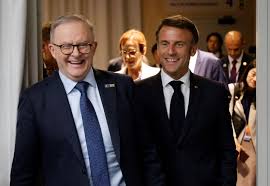France updates strategic documents, and its relationship with Australia

Paris: France’s latest strategic updates make one thing clear: Paris has turned a page on AUKUS and moved on. In July, it released new versions of its national security strategy (NSR) and Indo-Pacific Strategy, the latter published seven years after being launched in a speech by French President Emmanuel Macron in Sydney.
The overarching signal is unmistakable. Australia remains a valuable partner in France’s Indo-Pacific vision, particularly in the Blue Pacific, where Paris now prioritises joint action on climate change and countering revisionist powers.
While an Australian connection is strongly held in the Indo-Pacific Strategy, repeated across security, energy, transport, research and environmental cooperation, Canberra is absent from the NSR. But this absence should not be interpreted as a cooling of strategic ties, after all Japan and other regional partners are mentioned, but only once.
The NSR is not intended to serve as an exhaustive list of all partnerships because the document is not intended as a detailed diplomatic relation. The General Secretariat for Defence and National Security, which wrote the NSR, maintains strong relations with Australia, including annual dialogues with the Department of Home Affairs. In other words, there is neither a strategic shift nor bitter resentment from the shock of the 2021 AUKUS announcement.
The Indo-Pacific Strategy reinforces this view, mentioning Australia 15 times—more than Japan (12) or Indonesia (10). It highlights multiple frameworks in which Australia plays a central role, from the Pacific Quad (with Australia, New Zealand and the United States), the FRANZ agreement (with Australia and New Zealand), the KIWA initiative (including Australia, Canada, New Zealand and the European Union), the Quantum Development Group (with Australia and 10 other countries), and the India-France-Australia Trilateral Dialogue.
On the ground, cooperation continues to deepen. The French ministries for Armed Forces and for Europe and Foreign Affairs joined dialogues between officials and civil society in Canberra in November and December. Macron, in his opening speech at the Shangri-La Dialogue, called for closer cooperation and engagement with the members of the Trans-Pacific Partnership, which includes Australia. Last month, French troops from Marseille and New Caledonia, including a frigate, participated in exercise Talisman Sabre; last year, the French Air and Space Force took part in exercise Pitch Black; and, in April, Australia deployed forces to the Croix du Sud exercise in New Caledonia as well as Wallis and Futuna. A deputy defence attache will soon be appointed to the French embassy in Canberra to expand the defence staff—another sign of strengthened defence ties.
Concerns that the Pacific might slip down France’s Indo-Pacific priorities in favour of a stronger focus on defence industry and the Indian Ocean region, as promoted by some in Paris, have not materialised. The updated strategy prioritises the Pacific and Southeast Asia, aligning closely with Canberra’s own approach. These two regions offer unique opportunities to implement the core strategic priorities of this updated strategy with unchanged foundations: France’s ‘singular voice’ in international affairs; its maritime and demographic hubs in the two oceans, based on its seven overseas territories; Macron’s ‘strategic autonomy’, often related to regional states’ ‘third way’ to navigate US-China geopolitical competition; and a broad conception of security that includes environmental challenges.
Through the Indo-Pacific Strategy, Paris is also giving greater weight to regional organisations, as Macron explained at the 2025 Shangri-La Dialogue, and as demonstrated in recent visits to the Indian Ocean Commission and the ASEAN Secretariat. ASEAN is mentioned 22 times in the document. Additionally, signing a tentative agreement on New Caledonia last month was necessary to bolster the ‘central role of the overseas regions or communities’, especially within ‘Pacific-led regionalism’, as outlined at the 6th Pacific-France Summit last June. The third priority—consolidating ‘sovereignty partnerships’—echoes Macron’s call for ‘coalitions’ at the Shangri-La Dialogue (mentioned six times in his conclusion) and, more broadly, the idea of room for regional states to manoeuvre around the two main Indo-Pacific geopolitical powers.
Some challenges remain unresolved, particularly in advancing the fourth priority: ‘strengthening the European Union’s commitment to the Indo-Pacific’. At the Shangri-La Dialogue, Macron had also drawn attention to the EU’s Indo-Pacific strategy. The EU civil society is keen on displaying solidarity, through such events as the National Multicultural Festival in Canberra or the EU Business Forum in Nadi in September 2025. But on regional security, the EU could also make meaningful contributions to its regional partners.
Five years after Brexit, there are no signs of lingering resentment towards London within the European Commission and the member states. Beyond all these diplomatic and sometimes painful changes, France, Australia, Britain, the EU and its members are all seeking to work together, as stated during the meeting between Australia’s prime minister and the European Commission president in May, during the 37th France-United Kingdom Summit in July, the Talisman Sabre exercise in August, and most recently the renewed priorities in France’s Indo-Pacific Strategy. For Australia, future practical cooperation with France in the region looks bright.
EU ‘appalled’ after Israel demolishes West Bank school it was funding
Brussels: The European Union has condemned Israel’s demolition earlier this month of a school in the occupied West Bank village of Aqqaba that was being built with EU and French funding, Al Jazeera reports.
The school, torn down by Israeli authorities on August 5, had been intended to serve hundreds of Palestinian children.
In a statement, an EU spokesperson said the bloc is “appalled” by the demolition and “expects its investments in support of the Palestinian people to be protected from damage and destruction by Israel, in accordance with international law”.
France also previously condemned the demolition, stating it is “holding the Israeli authorities to account for this action”.





